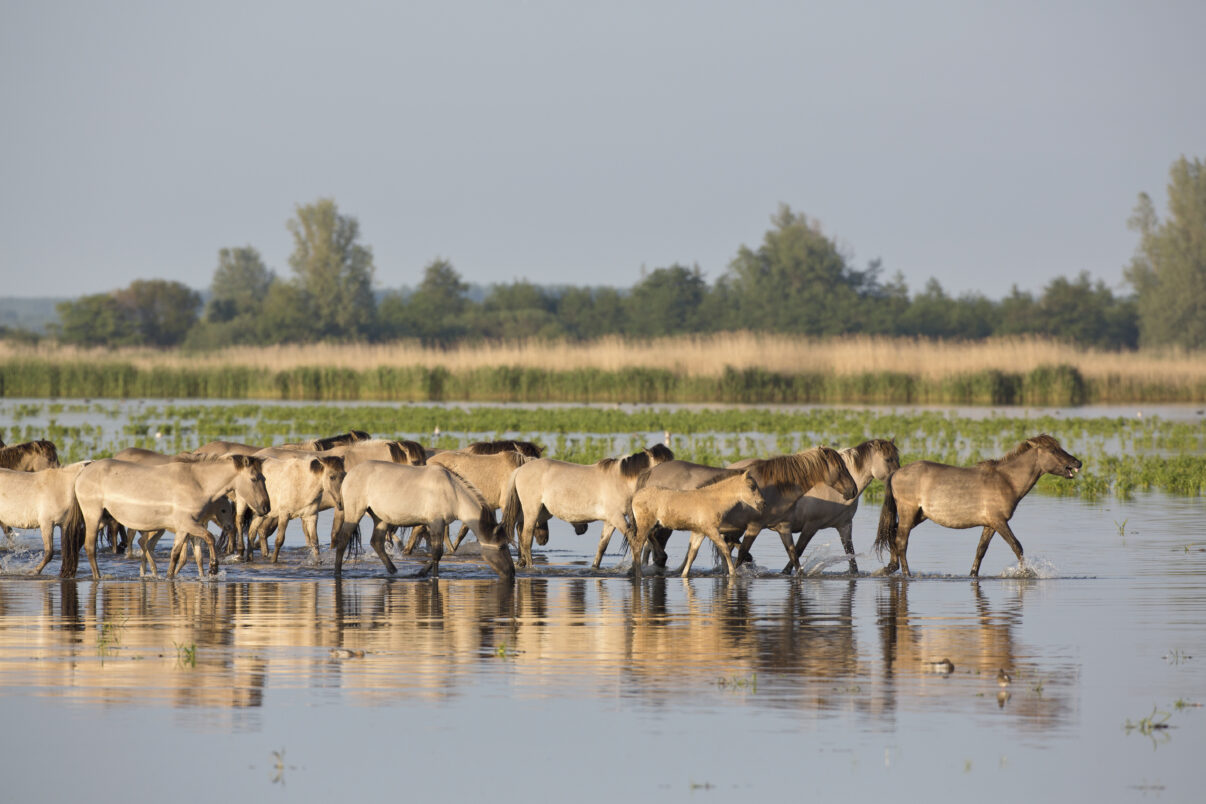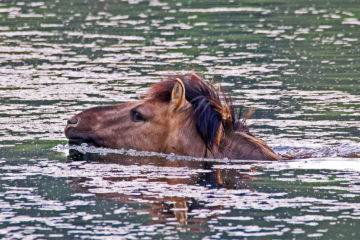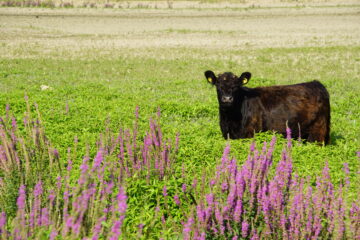From a rewilding perspective, the crossing of international borders by free-roaming horses and bovines is perfectly natural. But Europe’s existing regulatory environment often means such behaviour poses significant legal challenges. In a new GrazeLIFE report, ARK Nature and Renée Meissner of Herds and Homelands propose a range of solutions.

Focus on the Meuse
Coordinated by Rewilding Europe, the three-year GrazeLIFE initiative is currently evaluating the benefits of various land management models involving domesticated and wild/semi-wild herbivores. In the Netherlands, the project has focused on the Meuse Valley River Park, which follows the Belgian-Dutch border. The floodplains along the shallow River Meuse here have been greatly restored in recent decades and are now grazed by semi-wild herds of Konik horses and Galloway cattle.
In a previous blog, Deputy Director of ARK Nature Esther Blom described not only the ecological benefits of these large herbivores, but also the considerable legal challenges posed when Konik horses naturally cross the Meuse within the park and effectively enter a foreign country. Now, in a newly published GrazeLIFE report, ARK Nature and grazing expert Renée Meissner of Dutch non-profit organisation Herds and Homelands provide more detail on some of these challenges and offer possible solutions to enable the freer movement of grazers.
A growing challenge

In natural and semi-natural herds of Konik horses, young stallions will periodically leave the herd to see if they have more luck with the ladies elsewhere. In the Meuse Valley, this involves a spectacular swim across the River Meuse to look for mares on the other side.
These intrepid crossings take place infrequently now, but are expected to become more common as water levels in the Meuse drop and the river becomes more fordable. It is expected that bovines will also begin to cross the border, as the populations of both species continue to grow and seek out new territory and animals learn how and where to cross the river.
Economic interests
When it comes to Galloway cattle, cross-border movement is potentially even more complicated than for Konik horses. Belgian cattle herds enjoy Infectious Bovine Rhinotracheitis (IBR)-free status at national level. If Dutch Galloway bulls or cows, which are healthy but do not enjoy the same status, were to cross the river and mingle with their Belgian counterparts, the entire Belgian herd would be compromised. Significant economic interests are at stake.
In the new GrazeLIFE report, Renée Meissner of Herds and Homelands provides an insightful overview of the mismatch between rules for livestock and rules for wild grazers. She also proposes clear solutions to the challenges posed by cross-border natural grazing, which are applicable not only to the Meuse Valley River Park, but also other natural areas.
“Status aparte”

The most desirable and obvious solution – one which has not yet been used anywhere in Europe – is to give the entire cross-border nature reserve the same legal status. The external borders of the reserve, in both Belgium and the Netherlands, would then form the borders of a “status aparte” area. This area, and the populations of grazing animals it contains, would be labelled “semi-wild” – a new status that would complement existing ones for kept animals, zoo animals and wild animals.
This solution would also require separate management agreements for the semi-wild herds in the reserve that take account of the rewilding process. There would be no issue if any animals from these herds crossed the Meuse and mixed with others in the park, while herds of domesticated livestock outside the “status aparte” area would remain unaffected. ARK Nature is now discussing the viability of this solution with representatives of the Dutch government, which in turn is talking with Belgian counterparts.
Other solutions
If the “status aparte” solution proves unviable, other types of cross-border agreement may still be possible. One option is that all animals are allocated to the same owner – in this case either Belgian or Dutch – so that only one country’s regulations apply to the herd. Alternatively, instead of an existing manager, all the animals could be given to a single, newly created manager. Another solution might involve international agreements (in this case at the Benelux level) to deal with case-by-case situations.
A more advanced solution would be to give grazers the status of wild animals, rather than livestock. With the same status as deer, for example, they would then become part of nature, just like their wild ancestors. The new report concludes, however, that governments are not yet ready for this option.
Pioneering role
Grazing expert Renée Meissner recommends developing the “status aparte” solution for the Meuse Valley River Park and other European areas. To enable this development, it is important that agricultural subsidies and accompanying regulations – which are focused on production rather than the conservation and enhancement of wild nature – are not allowed to influence the management regimes of natural areas.
Thanks to their relative freedom to roam as semi-wild animals, the horses and bovines along the River Meuse have already developed social behaviour resembling that of wild herds. This, in turn, has had a positive impact on biodiversity, as the animals shape the landscape through their grazing and other behaviour. With the development of more supportive legislation, the Meuse Valley River Park can become a European showcase of the beneficial impact of cross-border natural grazing and free-roaming herbivores. It would also go some way to giving semi-natural grazers the status of truly wild animals.
Want to know more?
- New GrazeLIFE report ‘Crossborder grazing along the river Meuse’
- GrazeLIFE initiative
- Rewilding and natural grazing